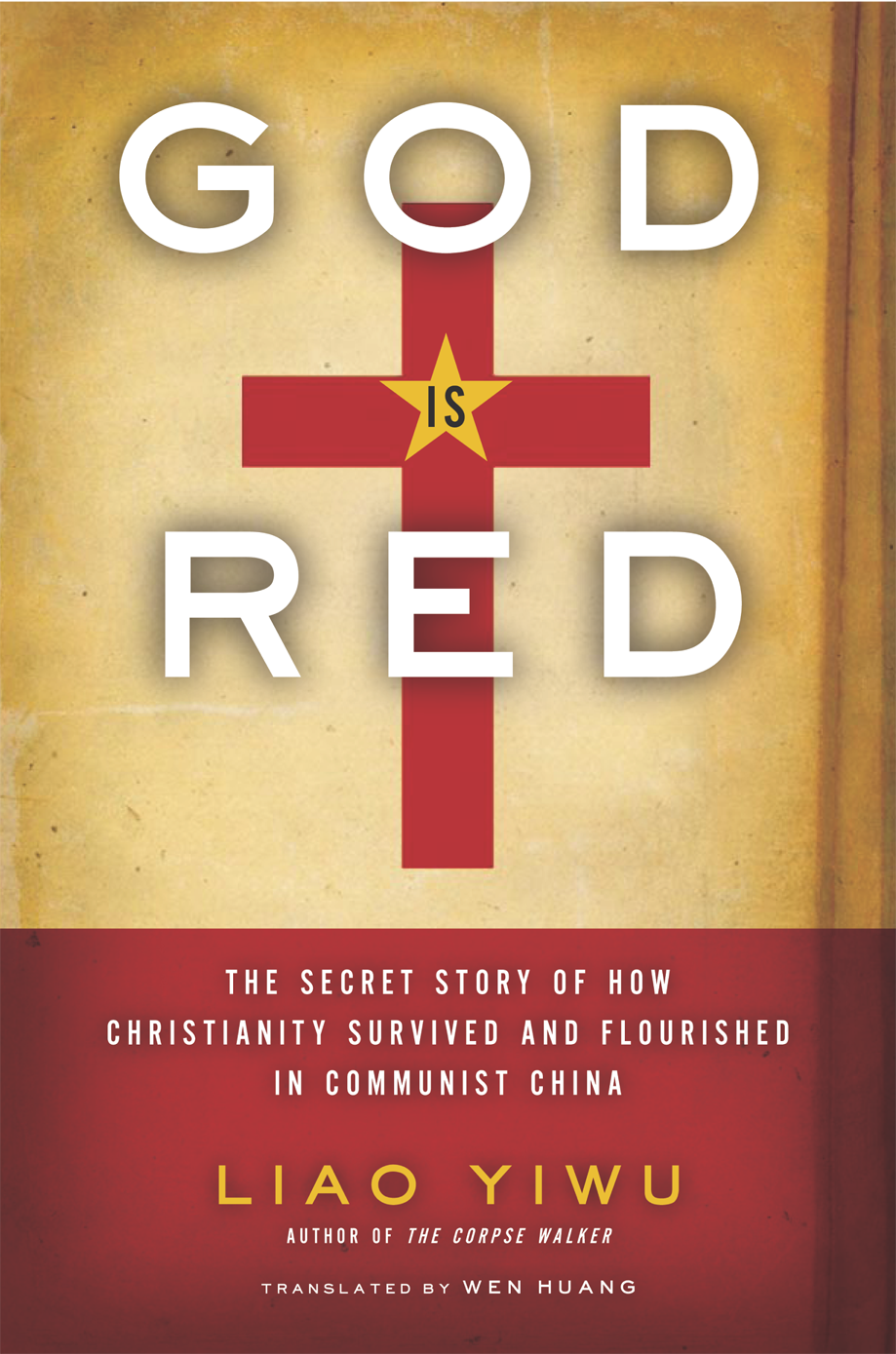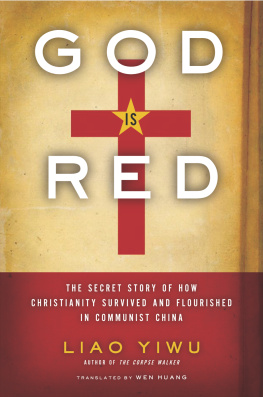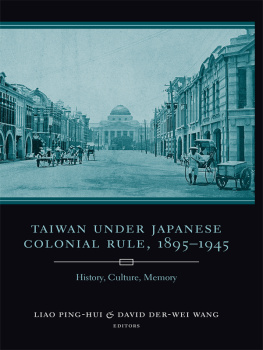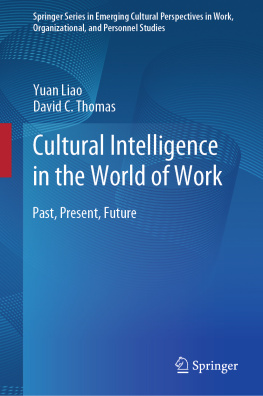
GOD IS RED
The Secret Story of How Christianity Survived
and Flourished in Communist China
LIAO YIWU
Translator: Wenguang Huang

Contents
L iao Yiwu is one of the most prominent and outspoken contemporary writers in China today. His epic poem Massacre, composed in 1989 in condemnation of the governments bloody crackdown at Tiananmen Square, landed him in jail for four years. His book The Corpse Walker: Real Life Stories, China from the Bottom Up (2008), which chronicles the lives of those on the margins of Communist society, remains banned in China. The Chinese leadership deems his writings subversive because they are critical of the socialist system.
Despite the adverse environment at home, Liao is undeterred and continues to give his curiosity full rein. In God Is Red , he turns his attention to an area hidden from the West for many years, one that remains a subject of immense controversythe resurgence of Christianity in China. The World Christian Database estimates that there are seventy million practicing Christians in China. In a society tightly controlled by an atheist government, Christianity is Chinas largest formal religion.
The number will no doubt surprise many Westerners who are more likely to associate China with incense-burning Buddhists and Taoists, or pragmatic Confucians, or red-flag-waving Communist atheists and spiritually ambivalent converts to consumerism.
Christianity entered China as early as the seventh century, and the scientific exchanges involving Jesuits in the court of Kublai Khan are well chronicled, but the religion didnt firmly take root until the nineteenth century, when improvements in transportation and access to the interior made it possible for waves of European missionaries to work in the Middle Kingdom. Before the Communist takeover in 1949, local Chinese Christian leadership, trained abroad or tutored by missionaries, accelerated its indigenous growth. According to the China Soul for Christ Foundation, the number of followers had reached seven hundred thousand when foreign missionaries were expelled in 1949.
Before Mao Zedongs death in 1976, many Chinese Christians were imprisoned or executed. In recent years, as the government began relaxing its control over religion, Christianity underwent explosive growth, though the Communist Party sought to keep the Christian movement in check by requiring all churches to belong to either the Three-Self Patriotic Movement or the Chinese Patriotic Catholic Association. The official China Daily reported in 2007 that there were an estimated forty million professed Protestants and about ten million CatholicsBeijing views Catholics as separate from mainstream Christianityin China. While a large number of Chinese chose to recognize the political reality and practiced their religion within the governments prescribed limits, others resisted, believing that only God, not the Party, could lay claim to their beliefs. They eschewed the official churches and gathered for worship in their homescalled the house-church movementdespite ongoing persecution by government authorities. The movement has been gaining momentum.
Liaos interest in Christianity began in July 1998, when he was visiting a friend in Beijing and met Xu Yonghai, a neurologist-turned-preacher with an underground Protestant church. It was the first time that Liao came into contact with a Chinese Christian. That meeting is described in a story called The Secret Visit:
I gathered from the scraps I could catch from their conversation that they were planning to print some banned materials. Yonghai was tense and would, every few minutes, raise his head furtively and look outside to see if anyone was there. They had apparently finished their business when Yonghai moved closer to me and whispered, We have to be careful. I think Xu Wenlis home is bugged. I nodded, acknowledging his caution.
He wanted Xu Wenlis help with a publication for Chinas underground church members and, warming to me, talked about the concept of salvation through God. I knew little about Christianity at the time and was interested in what he had to say, but deep down I rejected his proselytizing. In the end, I said, I dont go to the church. He laughed, I dont go to the church either... they are all government controlled.
Having grown up under the rule of Mao, when religious practices were banned and Communism was treated like a national religion with Mao at its center, deified and worshipped, Liao remained skeptical of any forms of religion. He had scant knowledge of Christianity, which had long been demonized by the government as spiritual opium brought in by foreign imperialists. However, for a writer who had been in and out of jail for his writings critical of the government, Liao felt strongly about freedom of expression and freedom of religion. He did not share Yonghais faith but admired his courage.
After returning to his hometown in Sichuan, Liao began researching the Christian faith in China and learned about the underground Christian movement, of which Yonghai was at the forefront.
Liao maintained contact with Yonghai and engaged in long conversations with him about politics and faith until early 2004, when Yonghais telephone was disconnected; Yonghai had been arrested while preaching at a private home in Chinas southeastern province of Zhejiang and was sentenced to three years in prison.
Yonghais arrest spurred Liaos interest in Christian issues. When he traveled to Beijing again in early 2004, his friend Yu Jie, a writer and prominent Christian activist, gave him a copy of a documentary made by Yuan Zhiming, The Cross: Jesus in China . The film chronicles the history and growth of Christianity in China and sheds some light on early Christian martyrs and individual believers, who are part of Chinas house-church movement. Seeing the extensive footage of large Christian gatherings was an eye-opening experience for Liao, and he felt compelled to include Christians in his wider project about people living at the margins of society in China today.
An opportunity presented itself in December 2004 when Liao, on the run from government agents who had raided his apartment while he was interviewing members of Falun Gong, a banned quasi-religious group, went into hiding in Yunnan. In Lijiang, he met a Chinese Christian doctor, identified throughout this book by only his family name, Sun, who gave up a lucrative city practice to do missionary work in the remote mountainous regions of southwestern China. Since Dr. Suns territory covered a large swath of Chinas minority regions, where early European and American Christian missionaries had been active, Liao asked to join Dr. Sun on several monthlong journeys that took him to villages with large populations of the Miao and Yi people, two of Chinas largest ethnic groups.
In those ethnic enclaves, impoverished by isolation and largely neglected by modernization, Liao stumbled upon a vibrant Christian community that had sprung from the work of Western missionaries in the late nineteenth and early twentieth centuries. Liao was granted rare access for an outsider.
Liao interviewed Christians at a gleaming white church that stood proudly among the mountain peaks, with a red cross displayed prominently on top of the steeple. He witnessed a prayer session in a crammed courtyard house where animals and humans lived side by side, forming a harmonious picture. At services celebrated like festivals, Liao heard illiterate villagers express their love of God with eloquence.
Next page








